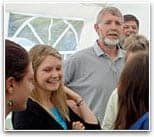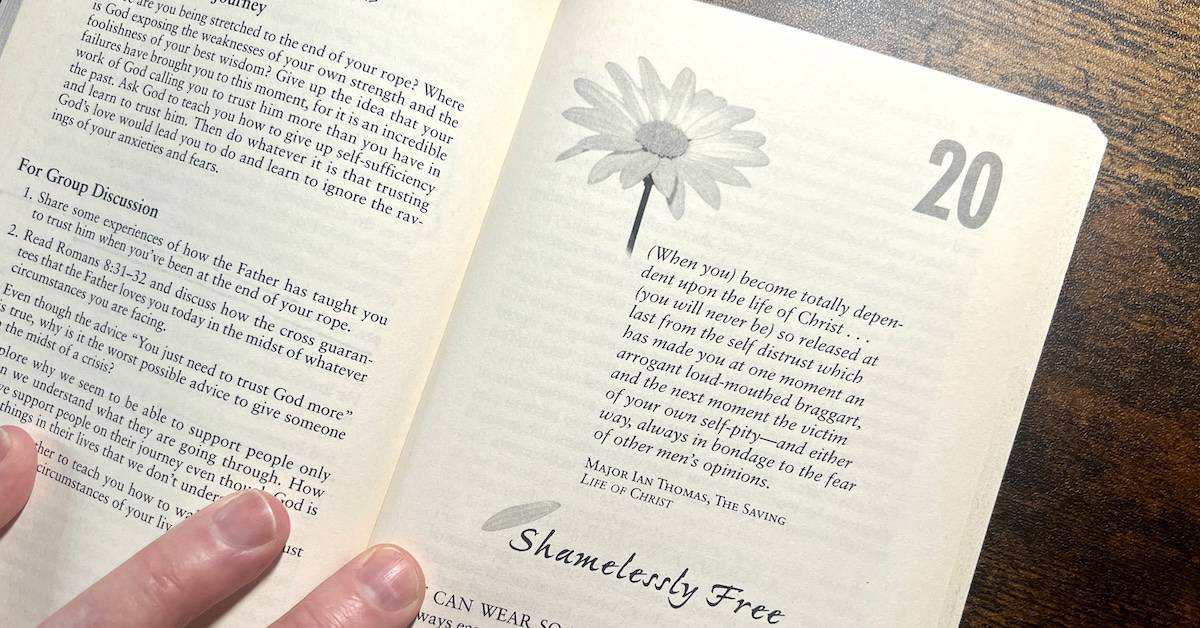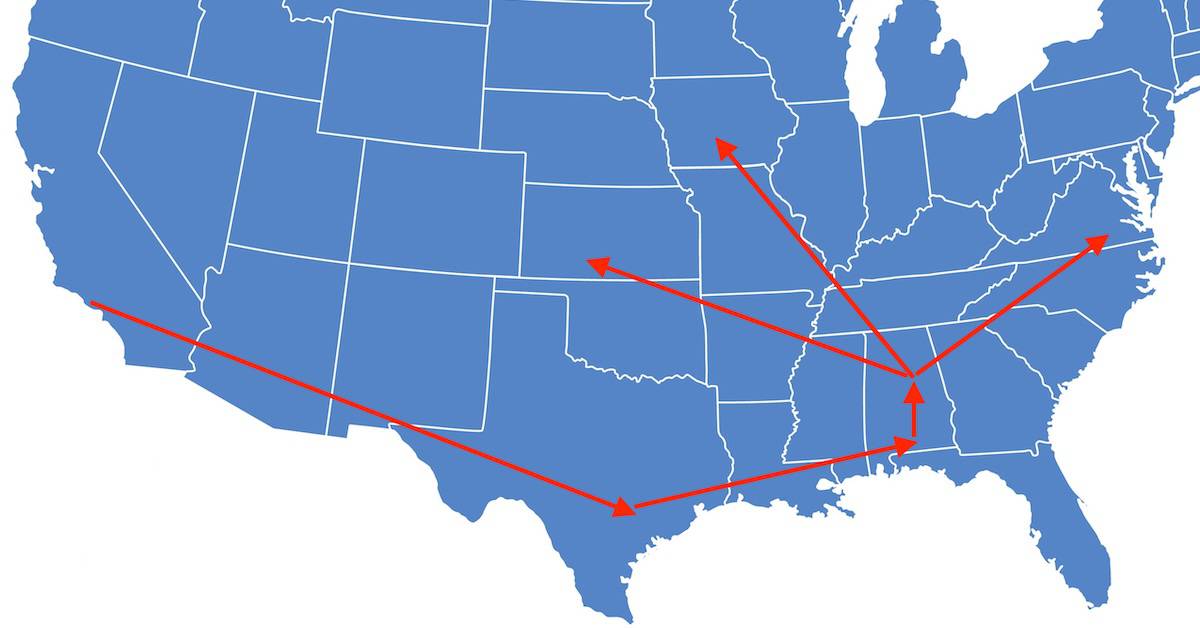Friends and Friends of Friends: Living in the Relational Church – Part 11
By Wayne Jacobsen
BodyLife • September 2007
Since I first wrote The Naked Church twenty years ago now, I have searched for a definition of the church that encompasses her majesty and yet explains in simplicity who she is and how she functions in the world. At first I thought that could be answered in structural ways as I moved from the mechanics of large institutions into more relational structures, like cell groups, home groups, and house churches.
But it didn’t work out that way, for which I am incredibly grateful. Defining the church structurally has two problems. First, the life of the church is found in the affection and cooperation of people who are living in Christ. No structure guarantees that reality. In fact, smaller groups who practice performance-based religion are even more dangerous than larger ones who do. Second, these definitions were inherently divisive – excluding brothers and sisters who met in different structures and inculcating a false sense of superiority in those who think they have finally recaptured ‘the secret’ of New Testament church life.
All the while, my relationships never reflected the reality of the definition for which I groped. I had close fellowship with brothers and sisters who gathered in a variety of expressions, all the way from large institutional gatherings to those who just live relationally alongside others. I wanted a definition that transcends all the structural ways we tend to see church.
This summer, however, I stumbled upon a definition that expresses the life of the church better than any I’ve yet run across. It crystallized in my thinking at a worldwide gathering of believers this summer and it has grown on me more ever since. Its application to a variety of settings seems to bear witness to its clarity as well as practicality. What is that definition? Simply I am coming to see the beauty of the church of Jesus Christ emerge in this day as “friends, and friends of friends.”
Now, I realize that needs a bit of explanation, so let me try.
An Example In Ireland
Those who read my blog or listen to The God Journey know I was part of an incredible gathering of believers this past June in Ireland. It was hosted by a number of people who have been living relationally around Dublin for almost 30 years. They were in the midst of forming a congregation in the 80s when God made it clear he hadn’t asked them to do so. They stopped meeting regularly, but continued to share the life of Jesus together as friends living alongside each other. They rarely all get together for a meeting, though it would also be rare if on any given day a number of them weren’t together in one way or another – sharing their journeys and helping each other.
This summer God brought together people from all over the world who are learning to live relationally in his family for a week of sharing life. People came from 10 different countries including Australia, New Zealand, South Africa, the United States and other countries in Europe. Most of those who came did not know each other beforehand, and many had never even been to Ireland before.
We spent the week together, beginning with a picnic on a Sunday in a field and ended in the same field the following Saturday with a barbecue. Nothing was planned beyond the meal for both of those occasions and the rest of the week we did not gather as a large group except to take a bus tour of that part of Ireland. But throughout the week in various homes and other venues pockets of people got together for meals, recreation, and conversation. By the end of the week we were blown away by all Father had accomplished without planning or scheduling any ‘ministry’ times. Friendships blossomed, deep issues discussed, insights shared and questions answered. We prayed together, cried together, and laughed together all the while watching Jesus emerge among us. Significant time was spent helping individuals through rough spots on the road through prayer and counsel. Friends and friends of friends could be together for a week and Jesus could accomplish all he wanted through that simple reality.
Most of those who gathered during this week, I had previously met in my travels. Watching friends of mine meet and enjoy other friends of mine was an absolute delight. I was blessed at how simply a web of connections expanded to encompass other people and how so many reported that they had time with were just the people they needed to know and could already see ways God might connect them in the future.
At one level, none of this surprised me. Most of my life is spent with friends and friends of friends that the Spirit is knitting together. I had similar times this summer in smaller groups whether it was on the beach at Lake Tahoe, in an old fellowship hall in Stratford, Ontario, or in a home in Naarden in the Netherlands. So many of the tasks Jesus asks me to do these days couldn’t be done without a network of other people, each supplying their part. My life has become an endless sea of relationships, some long-term, others just for a season. But I am convinced that the environment of growing friendships is where family flourishes, not in the rigid routine of an institution.
What amazed me in Ireland was that these same dynamics were visible on a larger scale with such diverse people. This is where I have been told it cannot work. People say friendships are fine for getting together locally, but it will not allow the body of Christ to function on a global scale. They are wrong. I’m convinced it’s the only way it can function globally. Institutions constantly fight over control, doctrine and money. But where Jesus builds friendships there is no end to the assets and resources he can bring together to accomplish his purpose. Nothing is wasted in political struggles or maintaining machinery. All the dynamics of body life in the New Testament apply better in growing friendships than they do in all our attempts at group building.
Jesus-Style Friendships
I know of no managed system large or small that can guarantee real community will emerge when it is implemented. Body life does not grow out of any management system, but out of the quality of a growing friendship with Jesus, linked together by people sharing that friendship with others. Even if you are part of a large institution, your quality of life in it will be found far more in the friendships you cultivate and how they stimulate you to live more deeply in Christ, than anything the corporate meeting alone can produce. Read the Gospels again and you will see just how much of Jesus’ mission was fulfilled in simple friendships, whether he was befriending weary fishermen returning in an empty boat, a greedy tax collector over lunch, or Mary, Martha and Lazarus in Bethany. He was persistently accused of being the friend of sinners, and enjoying their company. At the end of his life, he clearly stated to those early disciples that what he wanted from them was not the obedience of slaves, but the affection of friends (John 15:15).
Perhaps friendships may sound like too casual a word to describe the wonder of our connections to him and to each other, but that’s only because we look at friendship in human terms. Most friendships are built on a delicate balance of mutual benefit. As long as people provide something for us, we consider them friends. When they no longer do so, we move on. Because of that most of us have only known very shallow friendships that can be as fickle as the weather. And too many of us have tasted the bitter pain of betrayal when a good friend decides they have more to gain by leaving us out.
Thus, many of us shy away from deep friendships thinking we can protect ourselves from future disappointments. That is why we find it easier to trust the managed relationships of institutions than to risk the spontaneity of real and growing friendships. But that is to our loss.
Friendships as Jesus viewed them were not the what-can-I-get-out-of-you style of relationship, but the willingness to lay down our life for someone else. Until you know how he does that for you, you will never know how to do it for others. But once you’ve tasted it in him, you can’t wait to give it away.
That’s why real friendships don’t grow out of institutional rules and guidelines, but out of people connecting in a real way with Jesus and then with others. As we grow in the freedom of not needing to exploit others or be exploited by them we can begin to taste what real friendships are all about. These friendships are the building blocks of the New Testament community.
This is the kind of friendship I have shared with those who gathered in Ireland and the friendship that grew between others that week. I am convinced that this is how the bride takes shape in the world as the Spirit connects the body through affectionate and caring friendships. Friends and friends of friends, living, sharing and tasking alongside each other as each contributes what the Lord gives them. This is our engagement with the Body of Christ and will open the door to all the ways in which Jesus wants us to share his life together.
Growing Friendships
Obviously joining a group and becoming part of a growing circle of friends are two very different things. Most of us only know the former and the latter can seem threatening at first because there isn’t any place you can go to sign up for a real friendship. We can’t orchestrate them. They emerge as we recognize and invest time in those Father is asking us to walk alongside in a given season. Thus they begin the only place they can begin, not with others but with him!
First, learn to be friends with Jesus. He is the only source of life. Body life is the fruit of our walk with him not the means to gain it. Let your relationship with him grow. If you don’t know others with a similar passion, just lean in close to him and keep your eyes open. He may want you to himself for a time so that you will only be dependent on him. Eventually he will connect you with others.
Second, pursue friendships with those God puts in your path. The building blocks of body life are not found in groups, believe it or not. Jesus specifically pointed to the value of twos and threes coming together in him. Small conversations are where we truly get to know each other and recognize the life of Jesus in one other. Sitting in a meeting won’t do that. I’ve even been to home groups that have been meeting for prayer and Bible study for over 20 years who are not friends. They claimed to be the church, but there was no affection among them and no understanding of what it means to share life together. They were just committed to their weekly meetings.
Find ways to share a meal, an evening or an outing together. When you cross paths in a store don’t rush on with your day. Hang back if only for a moment and enjoy each other’s company. Relationships grow best in small conversations. Trying to form groups is a poor substitute for that, and often a structured way of trying to build friendships unwittingly subverts the process itself. Friendships flourish only in real conversations where people are growing to know and care about each other under Father’s love.
Now, watch the connections grow. Out of these twos and threes a marvelous network of friendships will emerge. As some of my friends get to know other of my friends the body takes shape around me. This web of interconnected friendships offers unlimited possibilities as to the ways the Spirit might connect us and show them how to cooperate together in doing what he asks. Gatherings of various groups will take shape, not because they are trying to have a New Testament meeting, but because they want to learn together, work together or in some other way express God’s work in the world. People who live like this learn to value every connection God gives them.
Those who played a part in facilitating what happened in Ireland and other places I go are those who have invested years in growing friendships. They aren’t trying to manage groups or form structured networks, but have simply let Jesus connect them to others and made time for those friendships to grow. And they have generously shared those friendships with their other friends.
That’s how the church takes shape locally, regionally and globally. I love seeing some of my dear friends become friends themselves. When I was in the U.K. this summer, I met a young couple that had just immigrated to the UK from South Africa. They knew a couple I’d spent some time with when I was there, who in turn knew an elderly couple living near them outside London. That couple connected them with some friends hosting my visit this summer. They came down to join us the weekend I was there. A week later I found myself sitting in Ireland with the couple from South Africa who started it all and the couple from London that passed it on. What a fun family – friends and friends of friends finding fellowship and life together, helping each other on the journey.
Do you hear the clicking of the Spirit’s needles as he knits the family together?
The Wider Family
What a joy it is to watch the church take shape not as the result of the vision of some man, or group of people scheming to create an organization to contain it, but seeing it as a reality than transcends all of our attempts to control it. Thus the church takes expression through millions of simple acts of friendship in response to Jesus’ leading and the wonderful fruit that flows from doing so. No human could ever control it and in the end there is no all-encompassing institution to be managed, financed, fought over or divided.
Expressions of the wider family are in his hands alone as we respond to him. That’s the church he is building. It permeates everything and ever place and no matter how we gather in groups with other believers, those moments of twos and threes, and eight and tens are the most important. It is where relationships grow, where people truly share their journey, and where we’ll find ways to do together what he might ask of us
As I sat in Ireland I couldn’t help but wonder how many other pools of interconnected friendships fill our globe. How easy it is for the Spirit to connect them when he is ready. Only two people have to cross paths for separate bits of the family to find each other. It is such joy to meet people who have no desire to manage God’s working – to pressure others with their pet doctrines or need to organize them for any desired outcome (or income). Living loved and sharing that love is really more than enough to give expression to this incredible family. Isn’t that what Jesus told us? (John 13:34-35)
A Fruitful Life Together
Seeing the family as an ever-expanding fellowship of friends, and friends of friends helps see the church as she really is. It also allows us to appreciate the organic growth that happens through friendship, rather than the imposition of any structured model that forces people into friendships that haven’t grown naturally and most likely won’t grow in that environment either. This view fulfills so much of what the New Testament teaches and demonstrates about the life of the church.
It keeps the focus on relationship. Instead of trying to build a corporate life on doctrine, programs, rituals or structures, people are focused on their friendship with Jesus and finding others who share that same friendship. The more your friendships grow the more involvement you have in the family. And those that have a hard time connecting relationally, can be befriended and helped by those who have found freedom to do so.
It is not meeting-focused, but relationally lived. Sharing life in the body of Christ does not happen by attending a meeting, but by growing in friendship with Jesus and our spiritual siblings. Of course the body will get together in a variety of ways as it celebrates those friendships. But it will do so as people want to be together with a specific purpose in mind, not just to follow an artificial routine. Until then our focus can be where Jesus put it – on connections of twos and threes as our friendships grow. And when our gatherings happen out of friendship they won’t be a static program put on by a few to entertain the others. lsbl.sept
It answers the dilemma of how much structure we need. We won’t want structures to attempt to manage friendships, because that will only prevent people from dealing with their differences and growing in the process. The structures we can embrace are those that facilitate what God is doing among a specific group for a specific season. We won’t need to start ministries or perpetuate groups for their own sake, but simply learn how to care about each other, stimulate each other to grow in him and do together whatever he asks us to do.
It resolves conflict without the appeal to power. Institutions have to provide clear decision-making authority, creating an environment based on who holds the power to make decisions others have to follow. Friends sort out conflicts not by deciding who is in charge, but through honesty and openness looking for God’s highest good and no one assuming they will know that for others. But a connection of relationships in agreement will have far more meaningful impact on others than any council making rules.
It can give proper place to the weaker believer. One of the Scriptures that always bothered me as a manager of an institution was Romans 14-15 where Paul talks about the stronger giving way to the weaker. There is absolutely no application of that in an institutional setting. Instead the stronger must take control over the weaker or chaos will result. In a family of relationships, however, those weaker in faith can be loved, extended the grace to be where they are in the journey and encouraged to move on to greater freedom, all in the context of friendship.
It allows leaders to truly be servants, helping others to grow rather than maintaining machinery. It also prevents those who are immature from aspiring to false leadership while hiding behind their personal charisma, eloquence or intellectual knowledge as a way to lord over others. True elders will simply be those a bit further down the road helping others find friendships as well.
It allows for wider connections, both in meeting new people and cooperating together in various efforts. When we think of the church as a specific institution who share a specific location, ritual or doctrine, we cut ourselves off from other relationships that God might want to arrange for interconnecting his family or touching the world.
The Power of Connections
I’ve been blessed over the last few years to be part of some amazing connections with individuals and networks of friends that God brought together for a specific season. The Ireland gathering was like that. It was a specific event whose ongoing fruit will only be measued by the friendships it produced. Almost everything I do now brings together friends in Christ each doing their part and results in something far more wonderful than any of us could accomplish alone. Perhaps the most amazing has been my experience with a new book a friend of mine wrote.
After unsuccessfully approaching on his behalf a number of publishers to print The Shack, we finally concluded that this was something God wanted us to do together. When we started pursing that direction we had so many missing pieces. But over the days and weeks, through friends and friends of friends we connected with people who could help us put it together.
Our biggest concern was how to get it out as broadly as we thought God wanted. Imagine our shock at selling out the first printing of 11,000 copies within four months of putting it on a web site, and talking to our friends about it. As friends passed it on to their friends the book just took off. Without one advertisement and without being in any bookstore, it spread like wildfire. Today some influential members of the national media have it in hand and the stories of how it has touched lives – especially those who have suffered great tragedy – continue to melt our hearts. We have been contacted by major book chains and distributors that we had no access to when we began. And we have turned down two top-tier Christian publishers who had rejected the book a year ago and now wanted to take it over.
I could tell you so many more stories of the simple joy and fruitfulness of people connecting with each other. Almost every where I travel now one of the great results is people who live in the same area who didn’t know each other before, get to meet each other. I get email long after I’ve returned home of the friendships that have grown and how people can now walk alongside some others as Jesus directs.
I could tell you of people in foreign countries living a life of expanding friendships that is giving great testimony to the reality of Jesus in the most brutal circumstances by simply loving and forgiving as they have found it in him. I do believe this is what he meant when he said the world would come to know him by the love we share one for another.
If you want to be part of that, just remember, the joy of living as friends, and friends of friends, does not come out of a desperate attempt to find friends for yourself, but by simply being a friend to whomever Father allows to cross your path. No, you cannot befriend everyone, but you can take the time to invest in those Jesus asks you to, whether they be a believer yet or not. And when you take the risk to cultivate that friendship, you’ll never know where it might lead.
Living Loved is published periodically by Lifestream Ministries and is sent free of charge to anyone who requests it. For those with email we recommend our web-based version so that we can hold down costs and get it to you much more quickly. This is especially important for international subscribers.
© Copyright 2013 Lifestream Ministries
Permission is hereby granted to anyone wishing to make copies for free distribution.
DOWNLOAD VERSION: PDF (115 KB)
Previous Issue of Living Loved Next Issue of Living Loved
Friends and Friends of Friends: Living in the Relational Church – Part 11 Read More »






 At his coming, Jesus will expose the dark powers that rule the earth, and the old order of those who compete for influence and power will dissolve into nothing. Kings, presidents, prime ministers, dictators, and CEOs will all lose their power, national identities will be obliterated, and suffering will cease at last. Though I have lost sight of it at times, I’ve never doubted that he will yet come.
At his coming, Jesus will expose the dark powers that rule the earth, and the old order of those who compete for influence and power will dissolve into nothing. Kings, presidents, prime ministers, dictators, and CEOs will all lose their power, national identities will be obliterated, and suffering will cease at last. Though I have lost sight of it at times, I’ve never doubted that he will yet come. And I anticipate with joy the day when all the chaos and conflict will be overturned by Jesus’s final redemption. I also look for that in every circumstance I encounter. Where does love lead me, and how will gentleness and kindness help me discover the better version of me?
And I anticipate with joy the day when all the chaos and conflict will be overturned by Jesus’s final redemption. I also look for that in every circumstance I encounter. Where does love lead me, and how will gentleness and kindness help me discover the better version of me? Order Part 1 of It’s Time from Amazon in Kindle or paperback
Order Part 1 of It’s Time from Amazon in Kindle or paperback
 “You need to slow down.” The words crossed my mind instantly. That’s where God began to teach me that my rapid pace wasn’t helpful to Sara’s freedom. Since then, “Life moves at the speed of Sara” has become part of my vocabulary. It applies to everything I do, from driving to preparing dinner to our conversations. I discovered I actually like living at a slower pace, making me more attuned to what’s happening around me or what others are feeling.
“You need to slow down.” The words crossed my mind instantly. That’s where God began to teach me that my rapid pace wasn’t helpful to Sara’s freedom. Since then, “Life moves at the speed of Sara” has become part of my vocabulary. It applies to everything I do, from driving to preparing dinner to our conversations. I discovered I actually like living at a slower pace, making me more attuned to what’s happening around me or what others are feeling.




